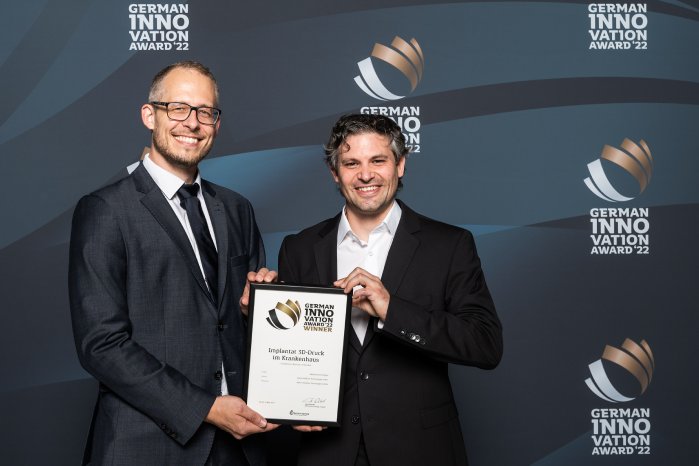This year, Apium Additive Technologies GmbH from Karlsruhe, which specializes in the additive processing of high-performance thermoplastics, engineering polymers and composite materials, was honored with the German Innovation Award. The 3D printing material polyetheretherketone (PEEK) plays a central role. This thermoplast only melts at 343°C, is about half as strong as aluminum with a density close to water, and is resistant to most acids and alkalis. It is also an electrically insulating material and is impervious to most high-energy radiation. The outstanding properties of PEEK, however, are countered by a very demanding additive manufacturing process. Apium Additive Technologies has pioneered this and opened up new application potentials for PEEK through the innovative and patented adaptive heating system of its 3D printers. For industrial applications, a resistant material such as PEEK coupled with the great design freedom of 3D printing is particularly relevant for small batches. For example, applications can be found in aerospace, microfluidics, high current insulators, and vacuum or fluid pumps. Furthermore, spare parts or functional prototypes can be produced with little effort as an alternative to metal. PEEK is not only suitable for industrial purposes, but also for the manufacturing of medical devices due to its biocompatibility. For example, PEEK implants for the repair of bone defects, preferably in the cranial region, are now being 3D-printed for precise fit and successfully implanted. Patients, hospitals and health insurers benefit from this technology in two ways. On the one hand, additive implant manufacturing is significantly less expensive than conventional methods, as up to 90% of material can be saved. Secondly, surgery time is significantly reduced thanks to the accurate fit of the implants. This leads to fewer complications and correspondingly shorter hospital stays for patients. This technological progress, which makes our lives better and contributes to a better future, offering more flexibility and lower costs, was honored by the jury of the German Design Council with the German Innovation Award.
German Innovation Award 2022 for Apium Additive Technologies
3D Printing Innovation Made in Germany
This year, Apium Additive Technologies GmbH from Karlsruhe, which specializes in the additive processing of high-performance thermoplastics, engineering polymers and composite materials, was honored with the German Innovation Award. The 3D printing material polyetheretherketone (PEEK) plays a central role. This thermoplast only melts at 343°C, is about half as strong as aluminum with a density close to water, and is resistant to most acids and alkalis. It is also an electrically insulating material and is impervious to most high-energy radiation. The outstanding properties of PEEK, however, are countered by a very demanding additive manufacturing process. Apium Additive Technologies has pioneered this and opened up new application potentials for PEEK through the innovative and patented adaptive heating system of its 3D printers. For industrial applications, a resistant material such as PEEK coupled with the great design freedom of 3D printing is particularly relevant for small batches. For example, applications can be found in aerospace, microfluidics, high current insulators, and vacuum or fluid pumps. Furthermore, spare parts or functional prototypes can be produced with little effort as an alternative to metal. PEEK is not only suitable for industrial purposes, but also for the manufacturing of medical devices due to its biocompatibility. For example, PEEK implants for the repair of bone defects, preferably in the cranial region, are now being 3D-printed for precise fit and successfully implanted. Patients, hospitals and health insurers benefit from this technology in two ways. On the one hand, additive implant manufacturing is significantly less expensive than conventional methods, as up to 90% of material can be saved. Secondly, surgery time is significantly reduced thanks to the accurate fit of the implants. This leads to fewer complications and correspondingly shorter hospital stays for patients. This technological progress, which makes our lives better and contributes to a better future, offering more flexibility and lower costs, was honored by the jury of the German Design Council with the German Innovation Award.


